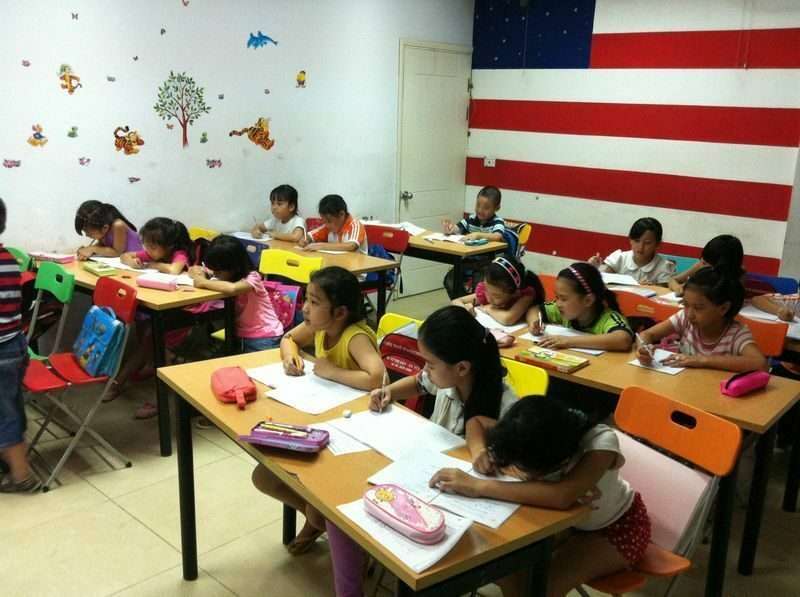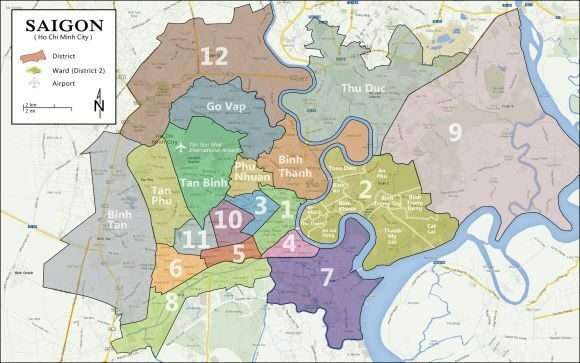How To Start Teaching English In Vietnam?
Vietnam was below the radar for ex-pats seeking teaching opportunities for a long time. Until recently, most teachers looking for English teaching jobs abroad in South East Asia head for Japan, South Korea or China. But today, the situation is rapidly changing. More and more job seekers are now interested in the country and are looking for opportunities especially teaching English in Vietnam, making it one of the highly sought after and best countries to teach English.

One of the reasons for the Vietnamese market’s sudden opening up is the change in government policy. A decade earlier, the Vietnamese government decided to improve English speaking skills in the country and promote it as a place to teach English in Asia. This is because Vietnam was on the cusp of growth, and English was required to promote international business and tourism. The new focus on English encouraged a boom in language academies. Professional language schools opened up in major cities, and the demand for native English teachers shot up.
Secondly, the country’s export sector has taken off. Vietnam has a new global approach to economic development and tourism. Vietnamese professionals and entrepreneurs understand the importance of English as a link language. There are more and more people aspiring to learn English.

Given this demand, is it possible that you can easily bag your dream job teaching English in Vietnam? Not really.
The Vietnam job market is large but needs to expand further. There is a scarcity of jobs in the public school system. Though the government initiated the English boom, the chances of getting a job teaching English in Vietnam’s public schools is practically impossible. That leaves you with two options, the language schools and the international schools.
The international schools are the most sought after. They offer very lucrative salaries and benefits. However, it would help if you had plenty of work experience. The qualifications required are also higher than in language schools. For young graduates seeking opportunities to teach English in Vietnam, this may be a market that is difficult to break into.

If you are looking to teach English in Vietnam, your best bet would be to apply to the language schools. However, be warned that not all schools have an easy work environment.
These schools are basically business enterprises, and their main objective is to churn out students with a certificate attesting to their English-speaking skills. As a conscientious teacher, you may find this approach unprofessional. Language schools also have class schedules aimed at attracting working adults. As a result, you may have to work early morning, late evenings and on weekends. It may not be an easy schedule to adhere to.
The plus side is that language schools offer a salary that will more than cover your costs. Your employment contract teaching English in Vietnam is normally for six months to a year. During this time, your savings potential is high.
Educating Abroad Quick Tip: It can be quite difficult to secure a job if you are a non-native English speaker. If you are finding it difficult check out our Teacher video CV / Resume to show them how good you are!
Most language schools are located in Hanoi and Ho Chi Minh City. When you begin your job search to teach English in Vietnam, focus your attention on these two cities.
You will have a greater probability of getting a job in the initial stages of the hiring period. In recent years, language schools have opened in smaller cities like Nha Trang, Da Nang and Hoi An. If your first two options to teach English in Vietnam do not work out, you can send your applications to schools in the smaller cities.
International schools in Vietnam include bilingual schools which follow the local curriculum. Opportunities teaching English in Vietnam in either the bilingual schools or those that follow other curriculums.
However, if you do not have the advertised qualifications and experience, the probability of bagging a job in these schools is rather bleak.
If you want a flexible work environment, private tuitions are a good option. The market is lucrative, with a demand for English teachers. The advantage is that you can fix schedules to suit your convenience. This gives you more time to follow your own interests or travel to see more of the country.
The disadvantage is that you will have no local support in getting the legal paperwork you require to teach English in Vietnam. You will have to do all the documentation and deal with the bureaucracy on your own. It would be best if you also had the knack for marketing yourself.
When Is The Best Time To Apply To Teach English In Vietnam?
The international schools year starts in September. The hiring period is between March-August. Since the competition is extremely tough for these highly sought-after positions, please ensure that your applications are ready by February end. You have a greater chance of realizing your dream of being hired by an international school to teach English in Vietnam if you are an early bird! The language schools are open to hiring all through the year.
Do you need to be in the country while looking for opportunities to teach English in Vietnam?
Ideally, yes! Being in Vietnam and following up on your application will definitely make a difference. Most schools have a well-structured recruitment process. After your application is shortlisted, you will have to appear for a face-to-face interview. You are also expected to give a demo class.
If you come to Vietnam before landing a job, you have to dip into your savings to finance your stay here. If that is difficult, you could do the first stage of sending out applications from your home country. You can come to Vietnam once you have scheduled 2/3 interviews and demo classes. Some teachers have done this successfully.
Educating Abroad Quick Tip: Vietnam schools expect you to conduct a demo class before taking a final decision. Most schools do not pay for the demo class.
What Are The Requiements To Teach English In Vietnam
To get a work permit to teach English in Vietnam, you need a Bachelor’s degree. It can be on any subject. You also have to be a native English speaker. This includes passport holders from the US, Canada, UK, Ireland, South Africa, Australia and New Zealand. A criminal background check is also mandatory.
An English teaching certificate like TEFL is not mandatory to obtain a work permit. But it is easier to get a work permit if you have an English-speaking certificate. This is because the school has to sponsor or provide documents for your work permit to the labour department. Most schools prefer candidates with at least 120-hour teaching certificate. If you have a TEFL certificate, it makes the process to get your work visa that much easier.
How To Get A Visa / Work Permit To Teach English In Vietnam
You have to supply several documents to the school so that the management can apply for a work permit. This includes:
- Degree certificate
- Passport photograph (2 copies)
- 2 notarized copies of all pages of your passport
- Criminal background check. This could be a Foreign Police Clearance Certificate, or Vietnam Criminal Record issued within six months of the application date for the work permit
- Health certificate issued by a foreign or Vietnam health care agency. The certificate must be issued within 12 months of the application date for the work permit
- English teaching certification or professional teaching certificate
- Letter of recommendation from former employers (if you have work experience)
- Application from the school requesting a grant of work permit
If any of your documents are in English or any other language, for example, your degree certificate or criminal background check, you have to get them translated and certified as per the rules of the labour department. It has to be certified by the embassy or consulate of your home country and the Vietnam Ministry of Foreign Affairs.
Once your work permit is issued, you can apply for a Temporary Residence Card. This is valid for 1-3 years. It allows you to enter and exit Vietnam without a visa.
Working As An English Teachers In Vietnam
Your salary will depend on your qualifications and the school. Most language schools hire teachers on a contract, per hour basis. You could work up to 35 hours a week. However, the average number of hours worked is usually 25. The pay ranges from $15-25 per hour. You could supplement this with private tuitions and earn an extra $500 per month. The monthly income of most teachers ranges between $1,000-$1,500. The saving potential is high since the cost of living in Vietnam is low.

If situated at a public school, you can expect around the same income. You will have 20-25 hours of classes a week. The difference is that you work the traditional 9 am to 4 pm schedule in public schools. This is not possible in language schools.
International schools offer a rewarding work environment, with salaries in the range of $3,000-$4,000 per month. The benefits are also substantial with paid vacations, housing and airfare. There are fewer students in a class compared to language schools or public schools.
Educating Abroad Quick Tip: Public schools and language schools rarely offer any additional benefits like airfare or housing allowance. However, most schools will process your work papers and reimburse the visa fees.
How Much Money Can You Save Teaching English In Vietnam?
Accommodation
If you are looking for a quality lifestyle on a budget, you have come to the right country. A careful spender focused on building a nest egg for the future, can have a decent lifestyle for as little as $700 a month. The average expenditure for ex-pat teachers is around $1,000 for a very comfortable lifestyle.
Most schools in Vietnam do not cover the full housing costs. Your accommodation will cost approximately 25 per cent of your expenditure. The rent for a small apartment in the city’s heart is approximately $400 – 500% per month.
If you find an apartment in the suburbs or away from the city centre, the rent will be in the range of $250-$300 per month. The utility bill, including electricity & water, will total $65. Internet and telephone charges will be in the range of $11.

Food
There are many things to love about this charming country. But most ex-pats who live in Vietnam will agree that Vietnamese food is definitely on top of the list. Vietnamese cuisine is popular throughout the world. One of the highlights of your stint here will be your eating-out experiences.
Luckily, restaurants are very affordable. A bill at the end of a substantial meal in an inexpensive restaurant or at one of the street stalls will be around $2. A three-course dinner for two at a mid-range restaurant will be $20.

5 Must-Have Vietnamese Specialties
1. Pho:
Vietnam’s most loved dish is a flavorful broth made of herbs, rice noodles, chicken, or beef. Sold widely in the streets, Pho is cheap and tasty. It’s so good that you can have it for breakfast, lunch, dinner or as an anytime snack!
2. Coffee:
The coffee culture runs deep in Vietnam. But it is the local coffees that rule the roost. Vietnamese like their coffee anyway – with/without milk, iced/hot, thickened with condensed milk. If you are feeling adventurous, try the coffee with yoghurt or coffee with egg. Trust us; you will not regret it.
3. Cha ca:
The dish consists of fried pieces of fish. That is a mundane description of this wonderful concoction that elevates fish to a whole new level with a dash of turmeric, garlic and ginger.
Some Quick FAQ's On Teaching English In Vietnam
How much do English teachers make in Vietnam?
English teachers in Vietnam can earn from $1000 USD at language centres who hold a TEFL certifcate. You could make as much $3000 teaching English in Vietnam, however this is reserved more for teachers who are qualified and teaching at a Vietnamese international school
Do you need a degree to teach English in Vietnam?
To teach english legally in Vietnam you do need to have a Bachelors Degree or higher. This is due to it being a requirement for gaining your work permit. However there are many others who are teaching English in Vietnam who do not have a degree, however they are working illegally.
4. Banh Xeo:
A crepe filled to bursting with pork, shrimp and bean sprouts cannot really go wrong! The delicious wrap gets an extra cover of lettuce leaf or rice paper. Accompanied by a sizzling sauce, the Banh Xeo is a mighty flavour bomb.
5. Rau Muong:
This is an acquired taste. Water spinach or morning glory, a leafy swamp vegetable, is stir-fried with lots of potent garlic. Once you get used to it, Rau Muong is pretty addictive.
Vietnam’s markets are bursting with fresh produce. Groceries will account for 36 per cent of your monthly budget. Here is a price list of some essential items in Vietnam.
Travel
Vietnam is infamous for its chaotic traffic. There are horrendous traffic jams on the roads during workdays. As you negotiate your way through countless vehicles, the constant honking and toxic traffic fumes can be pretty stressful. There is little discipline among commuters.
Public transport includes motorcycle taxis (Xe Om), regular taxis and buses. There are also bicycle rickshaws known as cyclo. However, your transport bill per month will depend on your ability to bargain. A monthly bus pass will cost around $8. Taxis charge $0.50 per kilometre.
But there are taxis with tinkered meters, and you could end up paying much more than the official rate. The motorcycle taxis charge $0.60 for a short trip. App-based taxis are also available.
Educating Abroad Quick Tip: Grab & Go Viet are two apps you should download for booking taxis this is similar to Uber and price is given upfront
Leisure
Leisure and entertainment activities are also extremely affordable in Vietnam. A monthly subscription to a fitness club is normally around $25. An evening out catching a movie will be $4.
The average monthly income in Vietnam is $400. Most ex-pat teachers earn two or three times this amount and can have an excellent quality of life. There will be enough of your income left over to save as well as travel around the country.
Educating Abroad Quick Tip: You can bring down your rent if you agree to sign a year-long lease on the apartment.
Other Sights, Sounds & Smells You Can Experience When Teaching English In Vietnam
When you begin teaching English in Vietnam, you get the chance to explore one of the fascinating countries on the planet. At the end of your contract, you will have several colourful and unforgettable memories to cherish forever.
From the wonderful flavours of Vietnamese cuisine to the beautiful beaches of Phu Quoc, from the buzz of Hanoi to the quiet caves of Phong Nha, from the adrenaline kicking sports resorts to the relaxed atmosphere at the famous Vietnamese spas, there are so many places to see and things to do.
5 Must Visit Places In Vietnam
Phong Nha-Ke Bang:

If you are a nature lover, you must visit the gorgeous natural park at Phong Nha-Ke Bang. The thick rainforests, rushing rivers and spectacular hills are worth a visit. But what makes Phong Nha-Ke Bang unique is the world’s largest underground cave. Known as the Hang Soon, the cave is awe-inspiring. The area is quiet and unspoiled, adding to its charm.
Halong Bay:

Truly stunning, the more than a thousand limestone islands of Halong Bay are a major tourist attraction. The area is a designated World Heritage Site. Cruising around the islands is the best way to discover them.
Ho Chi Minh City:

If you are not based in Ho Chi Minh City during your ‘teach English in Vietnam’ assignment, then do take the time to explore this fascinating city. A fascinating mix of the old and the new, the city is vibrant and noisy. Earlier known as Saigon, the city has reminders of the Vietnam conflict, which will touch your conscience and underline war’s futility. The French colonial buildings, the bustling food markets and the temples add colour to the city.
Phu Quoc Island:

Vietnam has plenty of fabulous beaches, but nothing quite compares with the Phu Quoc Island. Located in the south of Vietnam, the white sandy beaches, palm-lined coastline and turquoise waters make it a perfect weekend getaway.
Bac Ha:

: If you are keen on a rural holiday in Vietnam, visit the province of Bac Ha. You can trek through a lush landscape with emerald green rice farms surrounding quaint villages. The high point is its noisy, colourful and crowded Sunday market.
Views From Other Teachers Who Are Teaching English In Vietnam
Vietnam As A Place To Teach English: Our Final Thoughts
Teaching English in Vietnam is to go on a fun-filled adventure. The delicious food, warm people, bustling cities, and the countryside’s charm makes life in Vietnam pleasant indeed. The quality of life is great, with modern apartments having the West’s facilities and amenities available.
The greatest advantage is that you can save quite a bit during your Vietnam stint with the handsome salaries offered. Given these advantages, it is only natural that Vietnam is fast becoming a much-sought-after teach abroad destination.
In fact, you may even get nostalgic about the chaos and noise that is characteristic of Vietnam’s busy streets! This may seem a bit of an exaggeration if you are currently on a contract to teach English in Vietnam. After all, what is there to miss about the maddening traffic, constant honking and the voluble street fights?
But believe me, the vibrant streets of Vietnam, which reflect the never-say-die-spirit of its people, are a distinctive feature of the country.




















